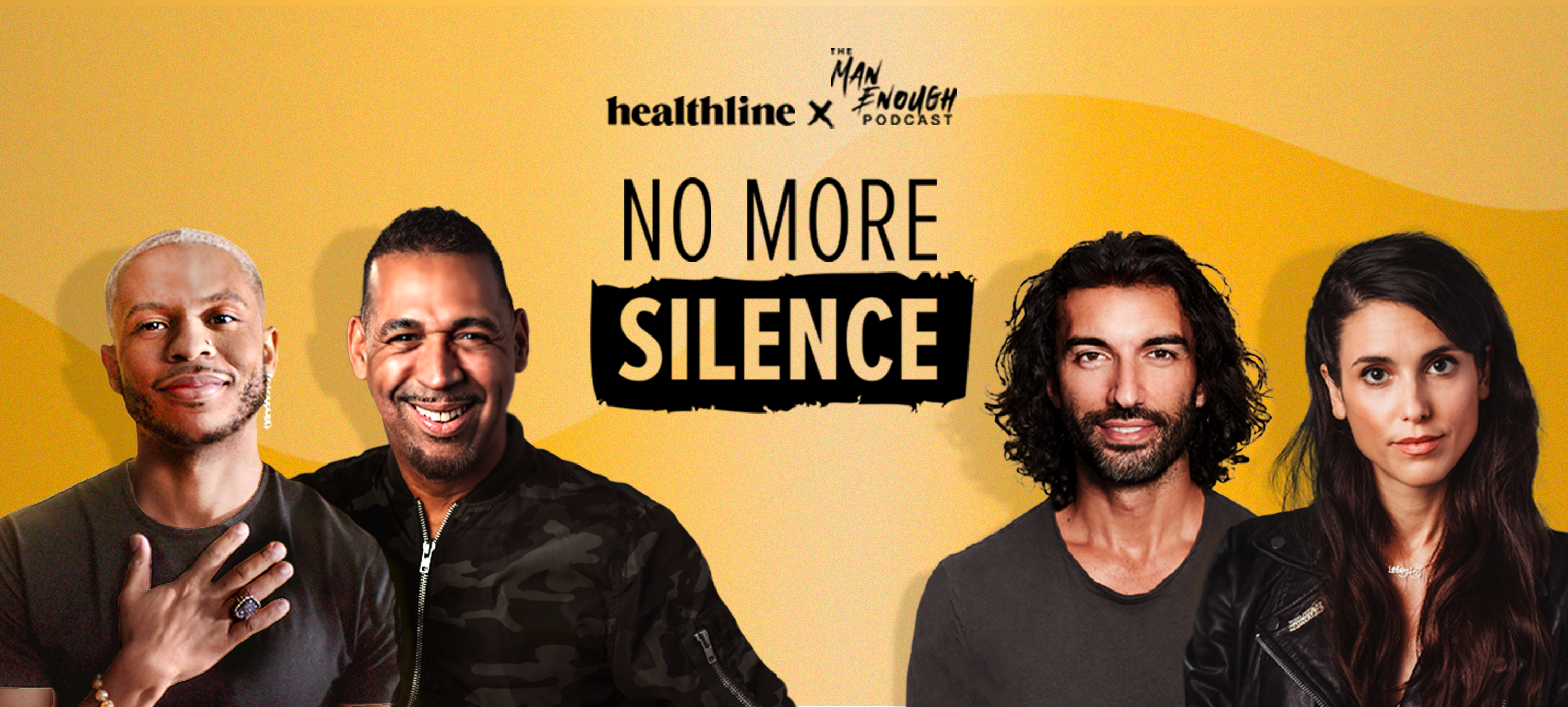Reimagining men’s relationship with masculinity and their health is a necessary health intervention. Men have a lower life expectancy than women, are more likely to develop a substance use disorder than women, and are more likely to die by suicide — but are often silent about their symptoms in part due to rigid, outdated conceptions of masculinity. This silence is literally killing us. It’s time to speak up.
For Men’s Health Awareness Month, Healthline is partnering with Justin Baldoni‘s The Man Enough podcast for No More Silence— a four-episode video series exploring different aspects of men’s health. Our panel of Justin Baldoni plus Man Enough co-hosts Jamey Heath and Liz Plank welcome healing justice worker Yolo Akili Robinson to share personal stories and advice for how we can break down the silence and stigmas surrounding masculinity. Below, they discuss how we can all do better to expand our definition of masculinity to create spaces for men, boys, and masculine folks to have compassion for themselves, practice vulnerability, and take actions toward a healthier tomorrow.
Yolo Akili Robinson: Vulnerability and Black Masculinity (Re)Imagined
Yolo Akili Robinson is an award-winning writer, healing justice worker, yogi and Founder and Executive Director of BEAM (Black Emotional and Mental Health Collective). In this episode, Yolo shares how early the socialization of “being a man” and “not expressing weakness” begins. Yolo’s work in peer counseling with Black boys and men, HIV/AIDS, and healing justice serve as powerful examples of what is possible when individuals come together to hold each other accountable with practical tools and community support.
Resources
- Black Masculinity Re(Imagiend)
- Tips for Finding a Healthcare Provider Who’s an LGBTQ+ Ally
- From Psych Central: Healthy Masculinity
- From Psych Central: Inside Mental Health Podcast
Justin Baldoni: Compassion for Male Bodies: Preventative Care and Body Image
Some might think the handsome, successful actor/director Justin Baldoni doesn’t have a worry in the world when it comes to his physical and mental health: think again. Justin shares his experience with body dysmorphia — only exacerbated by the entertainment industry — and Yolo and Justin share practical mindfulness tips to identify motivations with the “why ladder.” Justin also shares how his father’s resistance to seeing a doctor encouraged Justin to take a proactive approach to his own preventative care screenings for colorectal cancer, a major men’s health risk.
TW: body dysmorphia
Resources
Jamey Heath: Healthy Aging and Power of Peer Support
Growing up, Jamey felt expressing weakness was not an option for him, especially as a Black man. Through years of therapy and participation in 12-Step programs, Jamey shares how he is taking proactive care of his physical and mental health. As a man over 50, Jamey’s example is a powerful one for older folks who would benefit from regular screenings with a primary care physician, especially for conditions like skin cancer, colorectal cancer, cardiovascular disease, and prostate cancer — which become more commonly diagnosed and life threatening among men as they age.
TW: sexual abuse, intimate partner abuse
Resources
- The Ultimate Preventative Care Guide for Men
- Skin Cancer Screenings for Men: Why It Matters and What to Expect
- The Sunscreen Gap: Do Black People Still Need Sunscreen?
Liz Plank: Gender, Stigma, and the Critical Role of Language in Health
Have you ever felt that you couldn’t possibly suffer from a health condition because it wasn’t “manly?” In this episode, Liz and Yolo share an intimate exchange on how mental health conditions and domestic abuse are often gendered, adding to the challenge of speaking about these stigmatized health topics. This episode is a sobering reminder of using conscious, inclusive language in healthcare and the power of the words we use.
TW: intimate partner abuse
Resources
More Content from No More Silence
- ‘Man Enough’: Why Masculinity Is a Risk to Everyone’s Health
- Masculinity, Undefined: An Interview with Justin Baldoni
Stay in Touch
Sign up for our Men’s Health newsletter and other wellness newsletters here.
